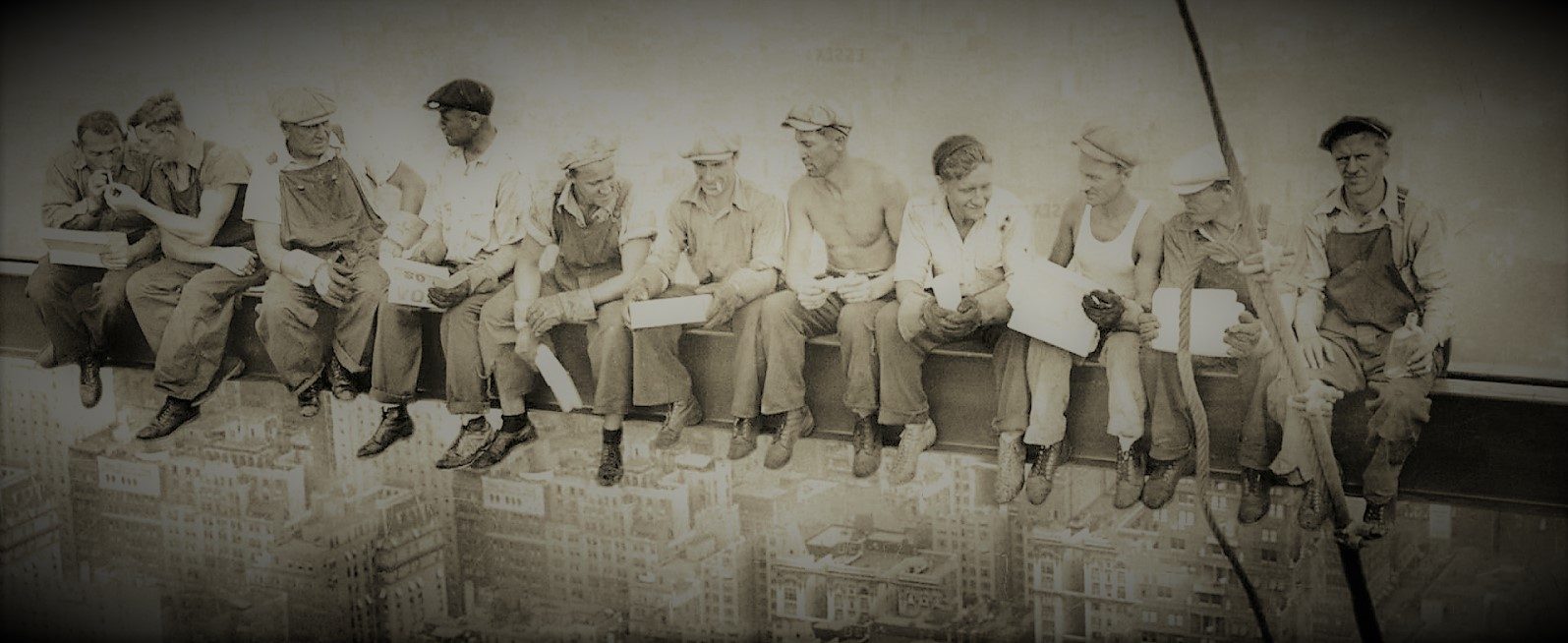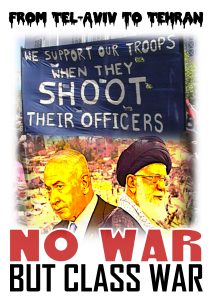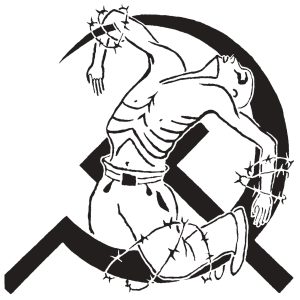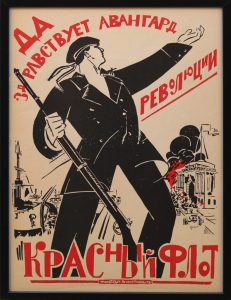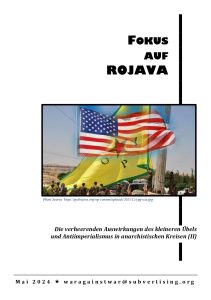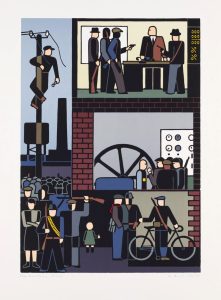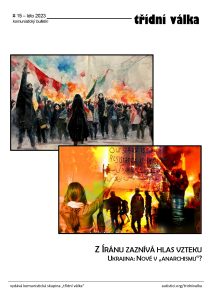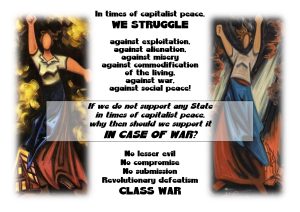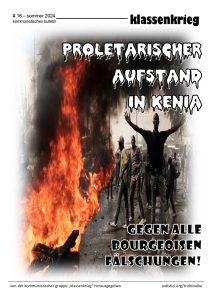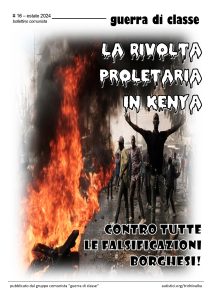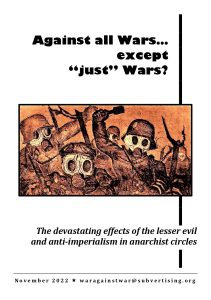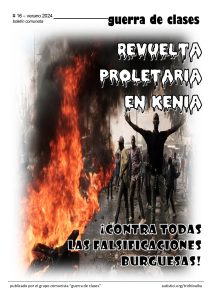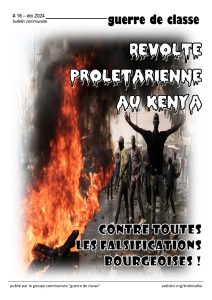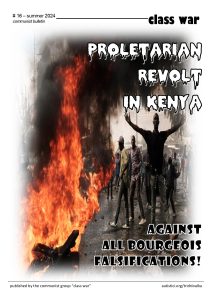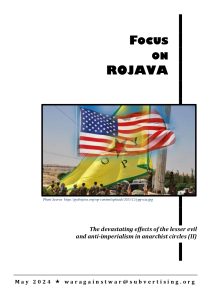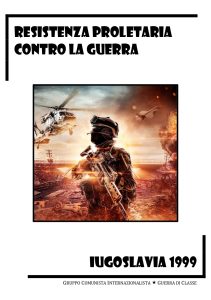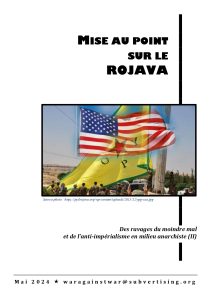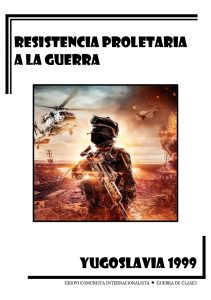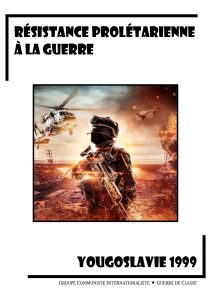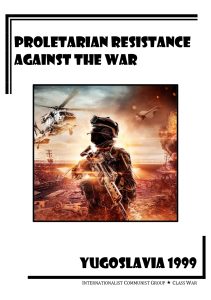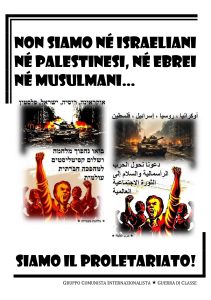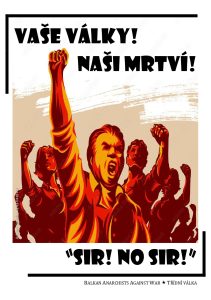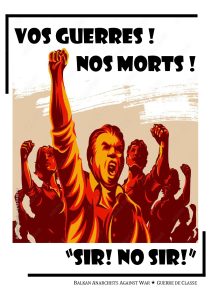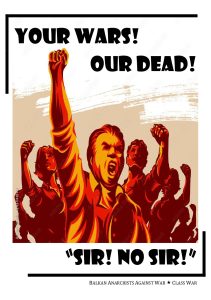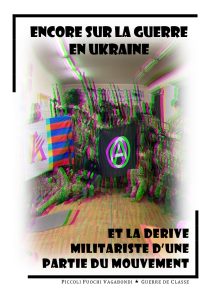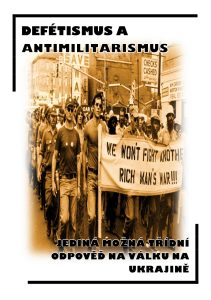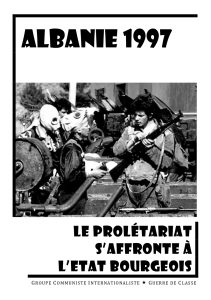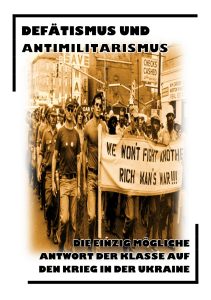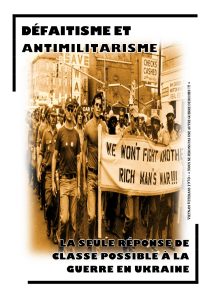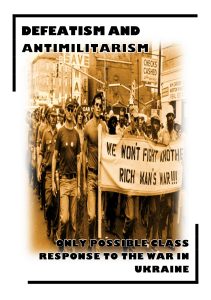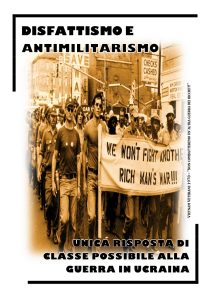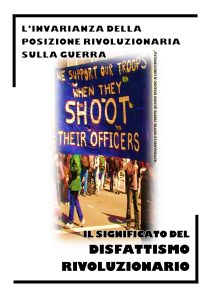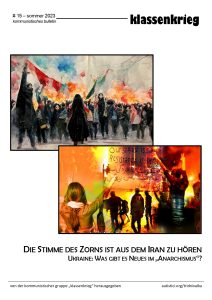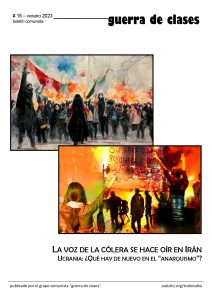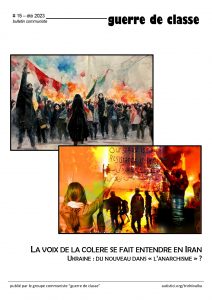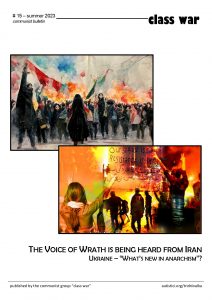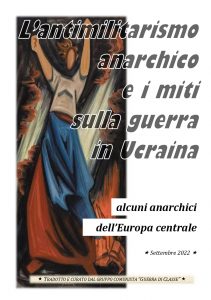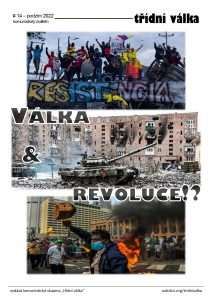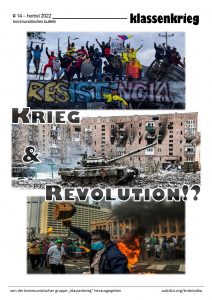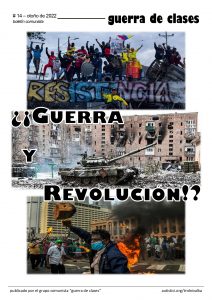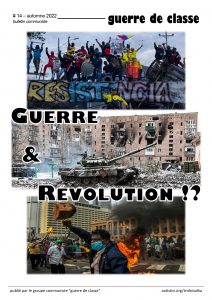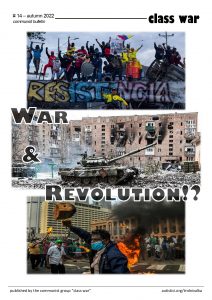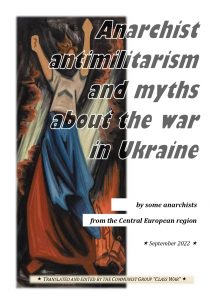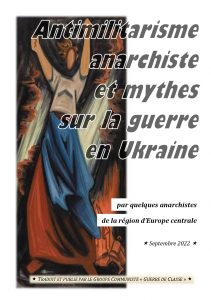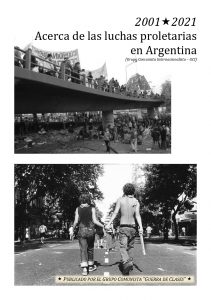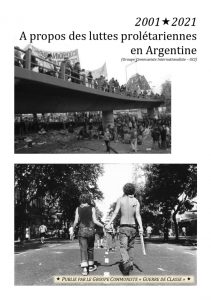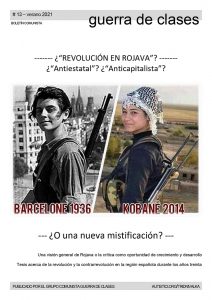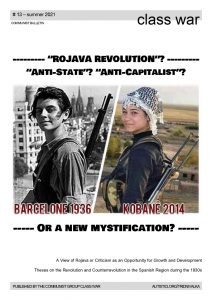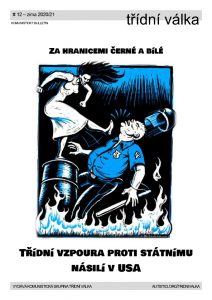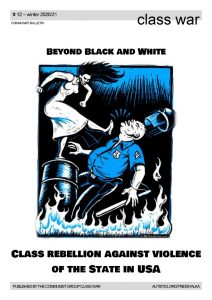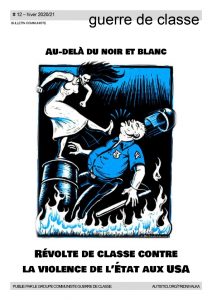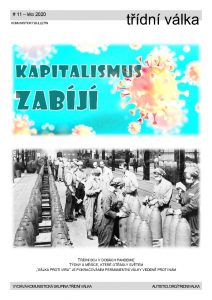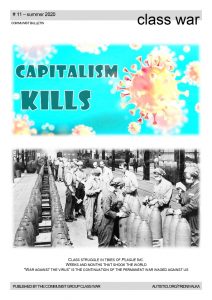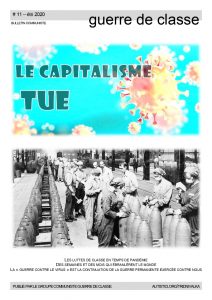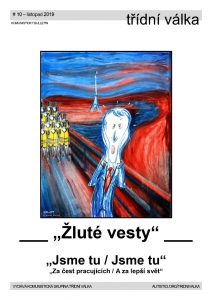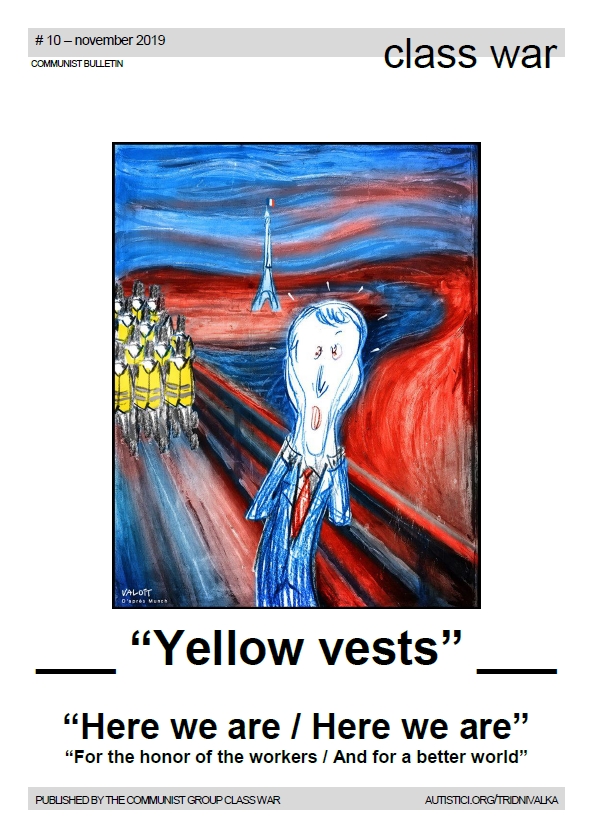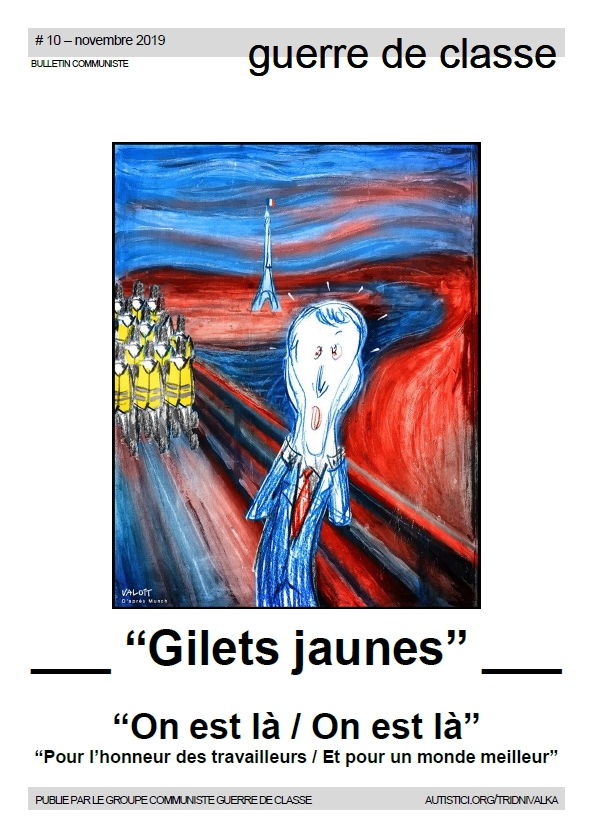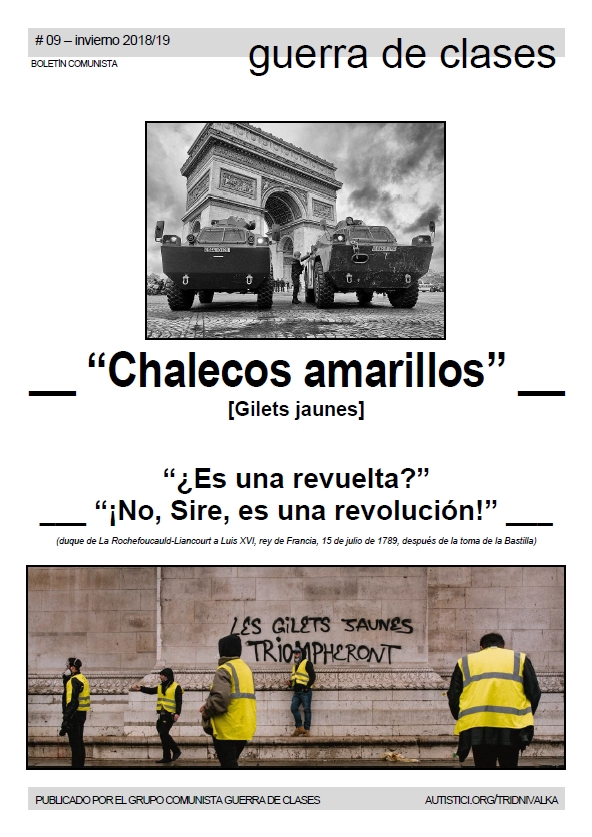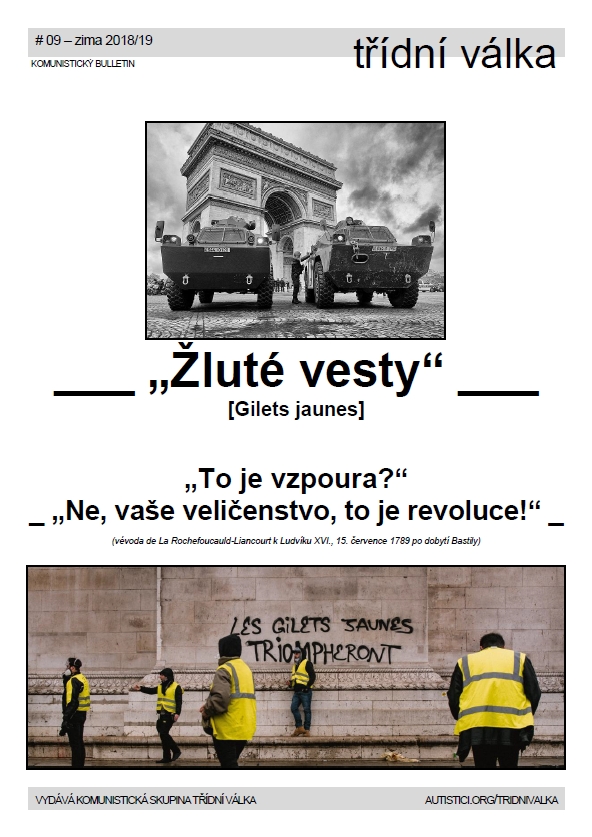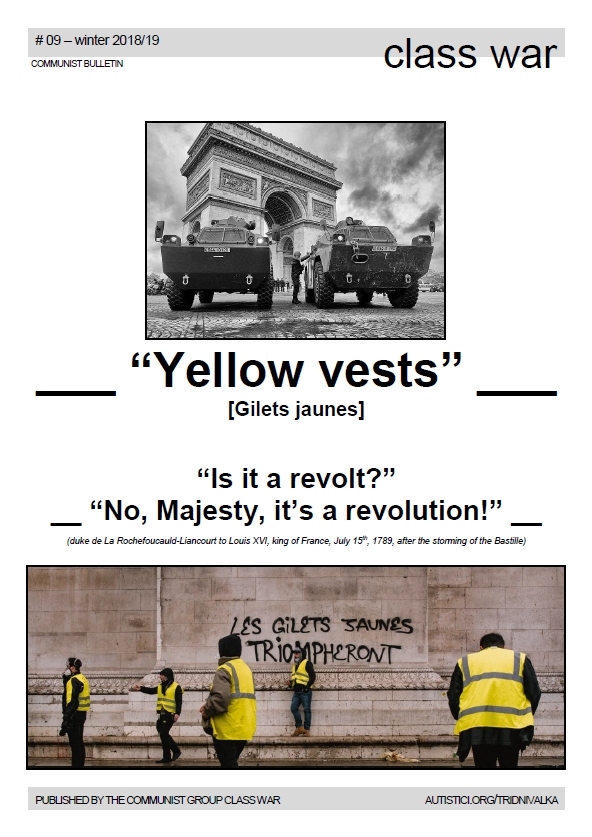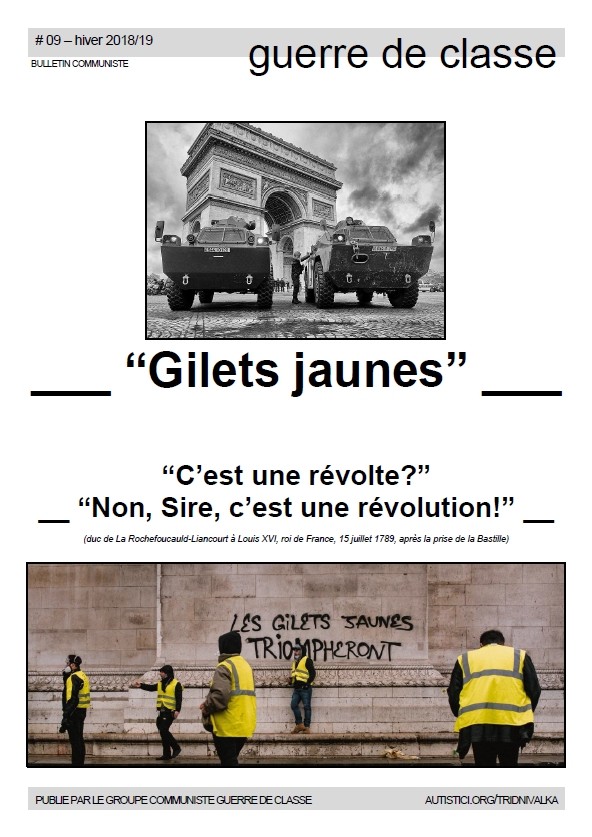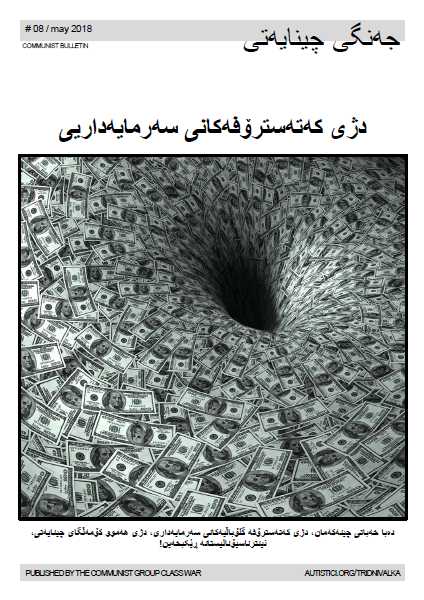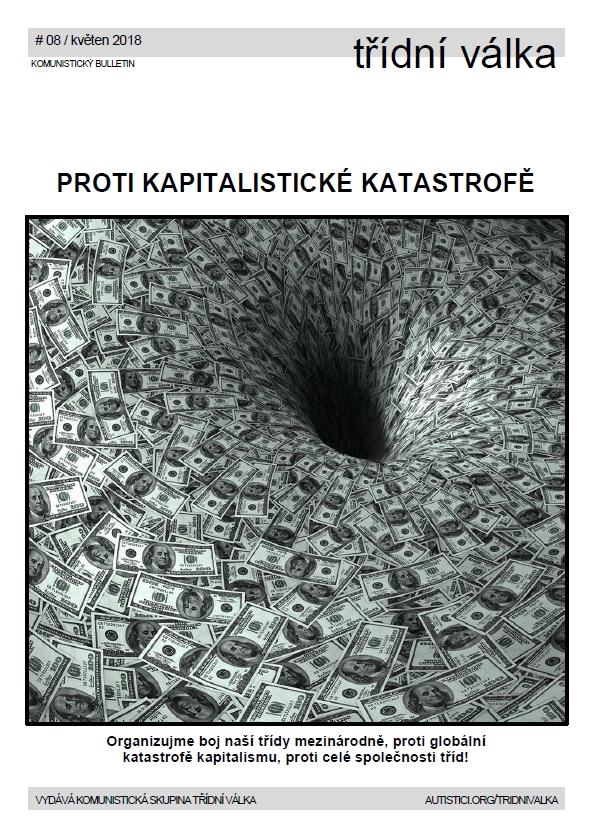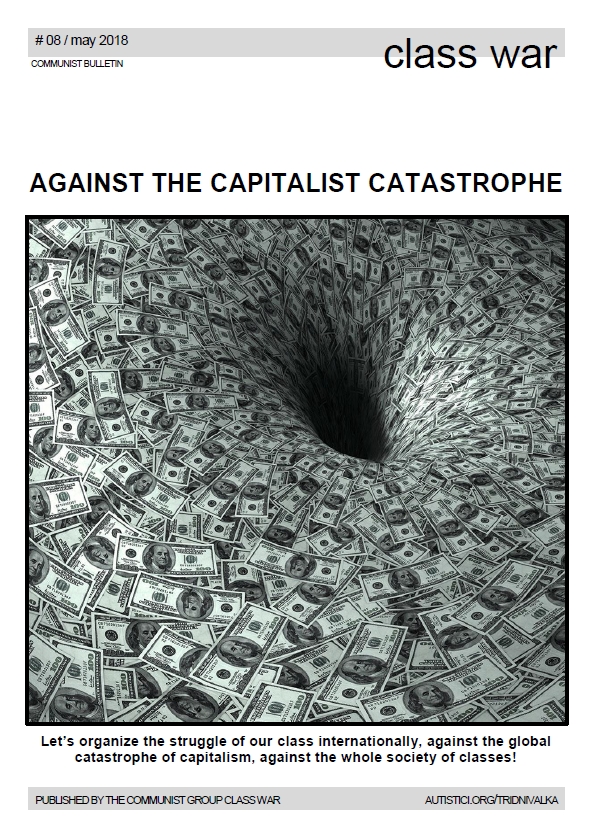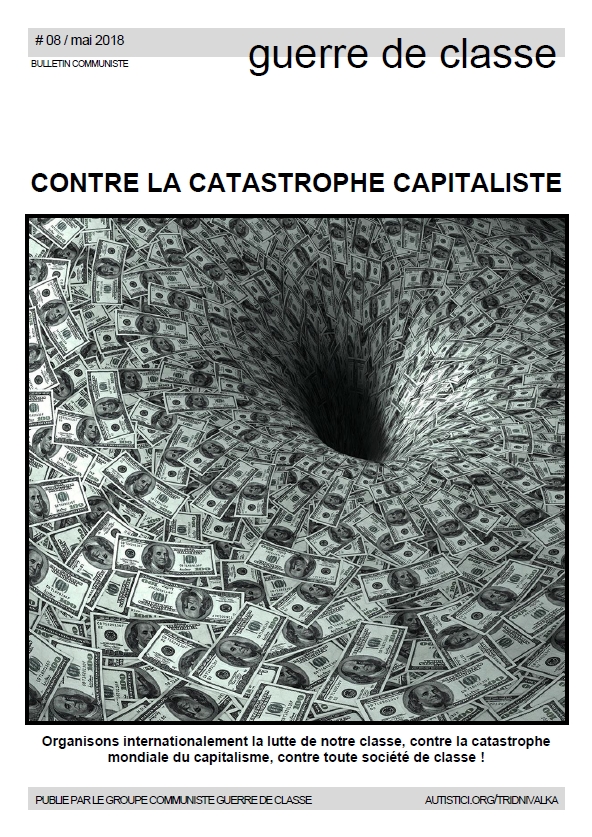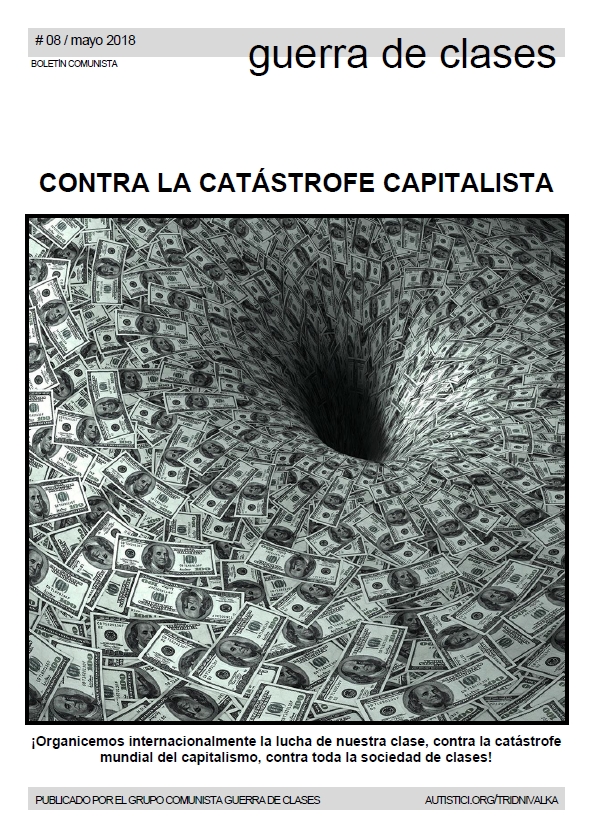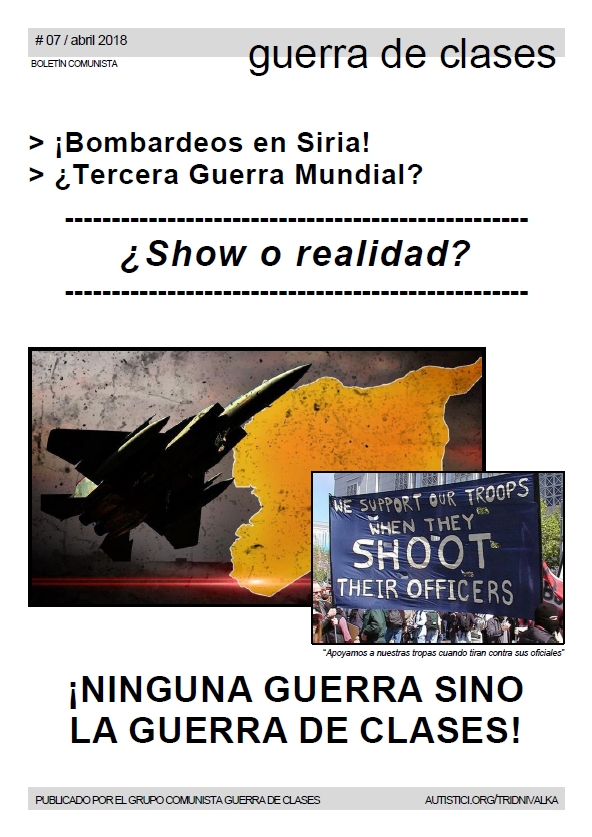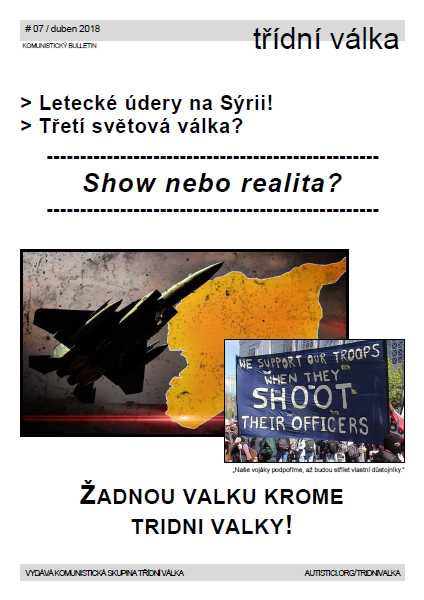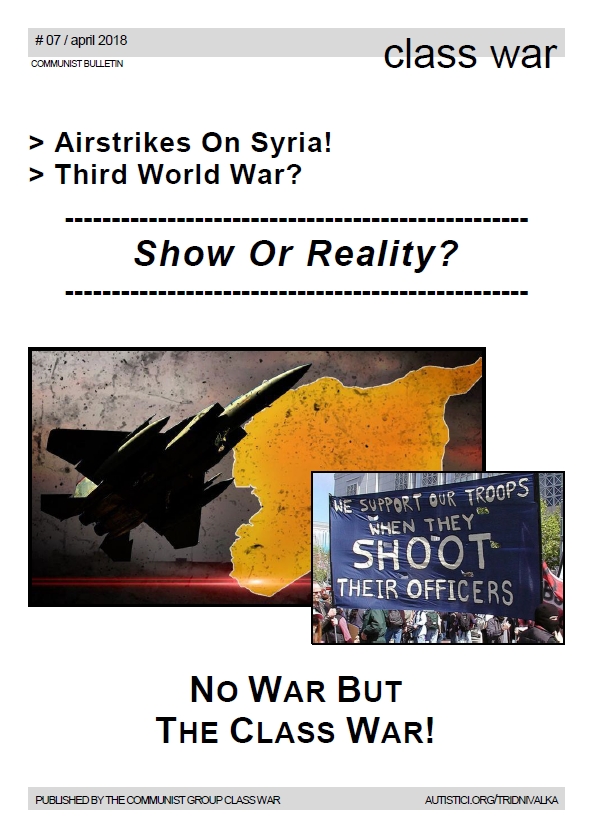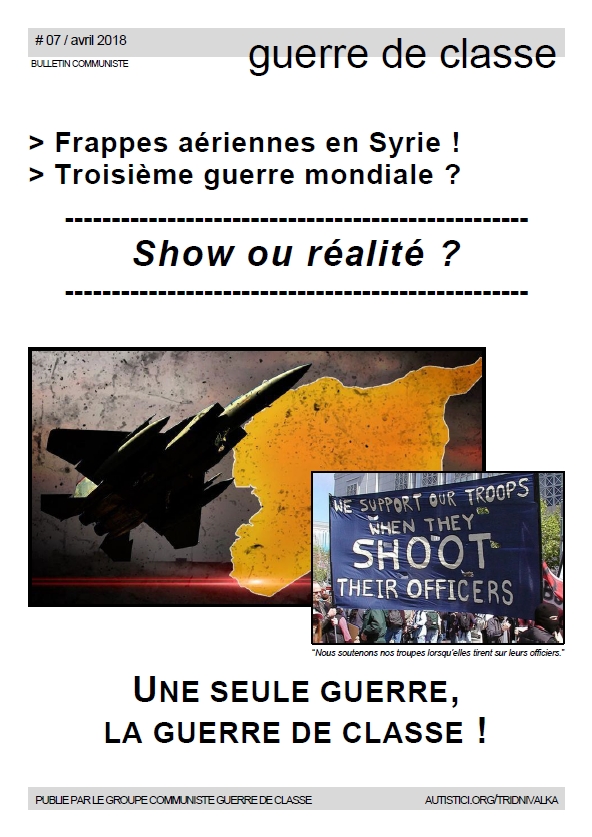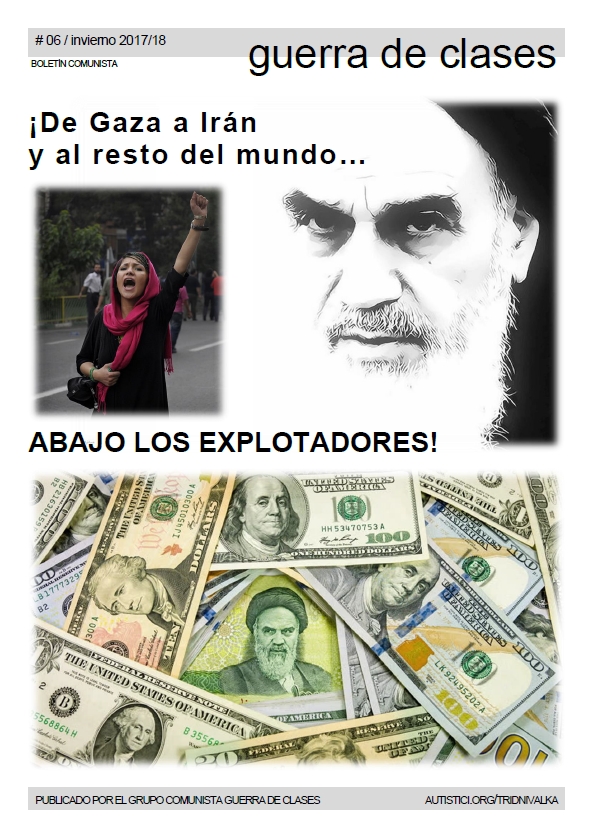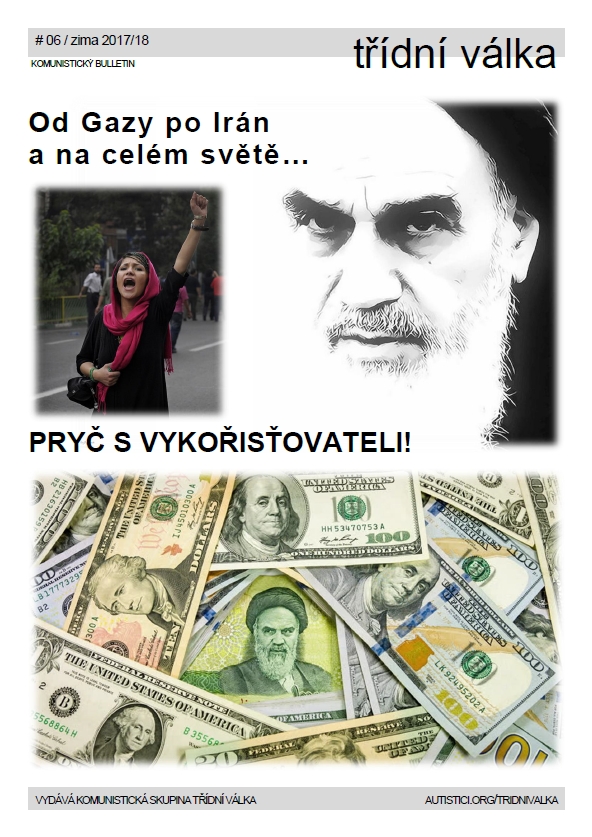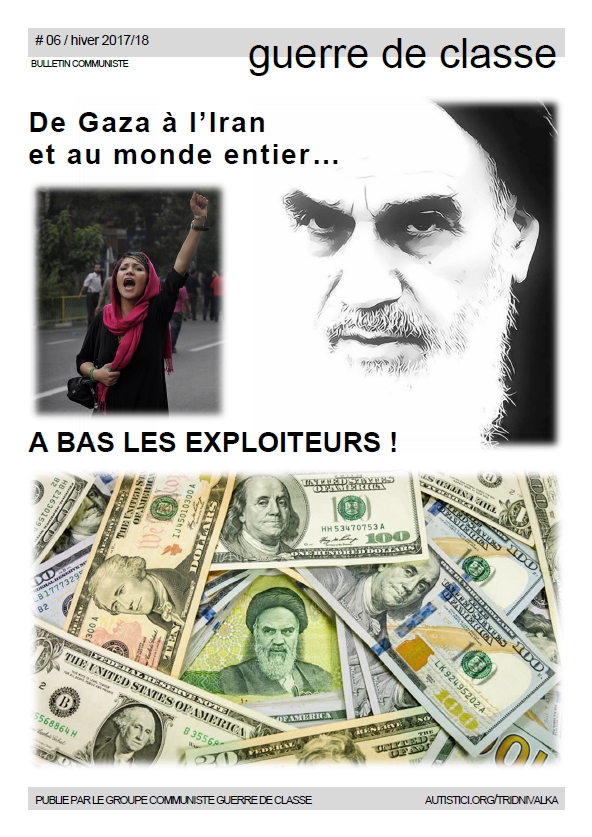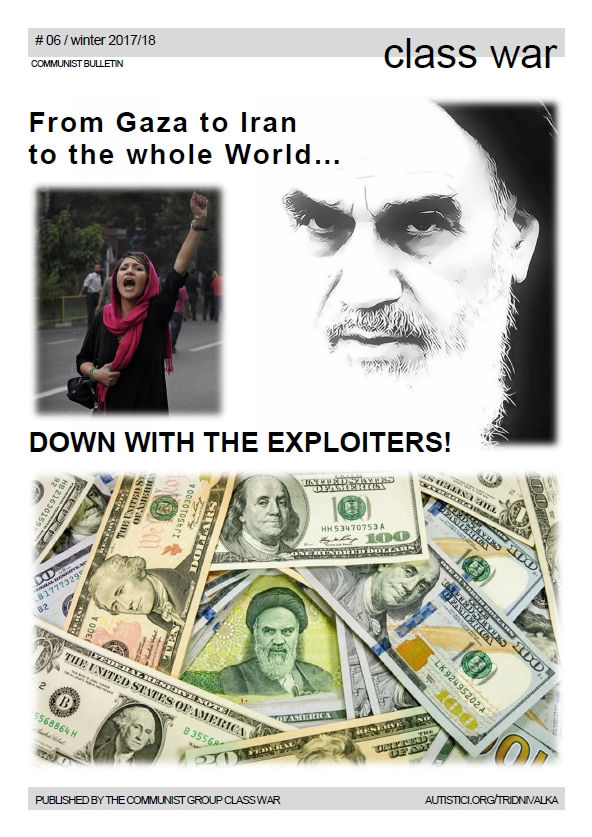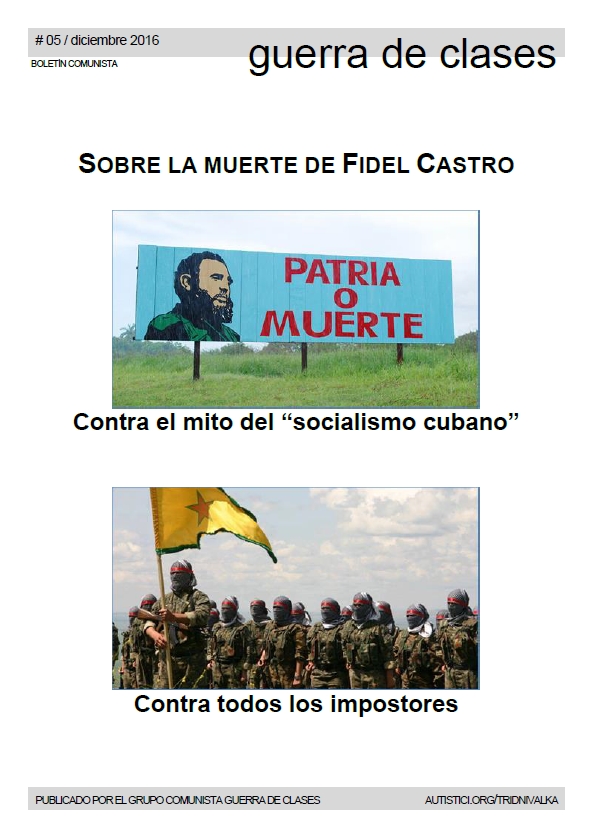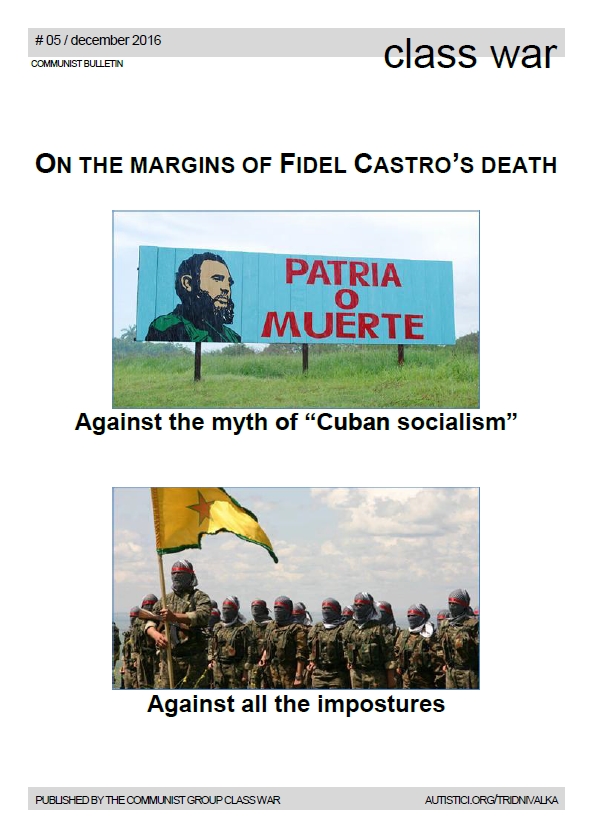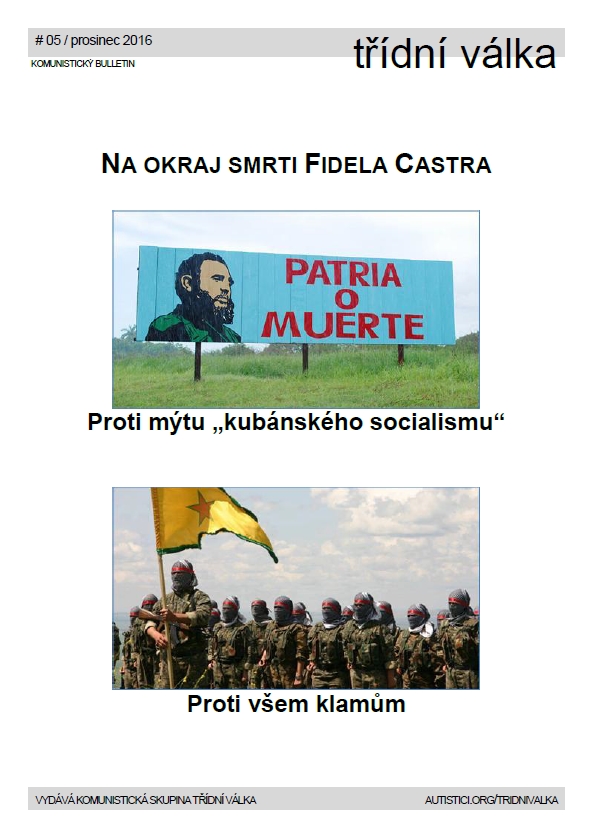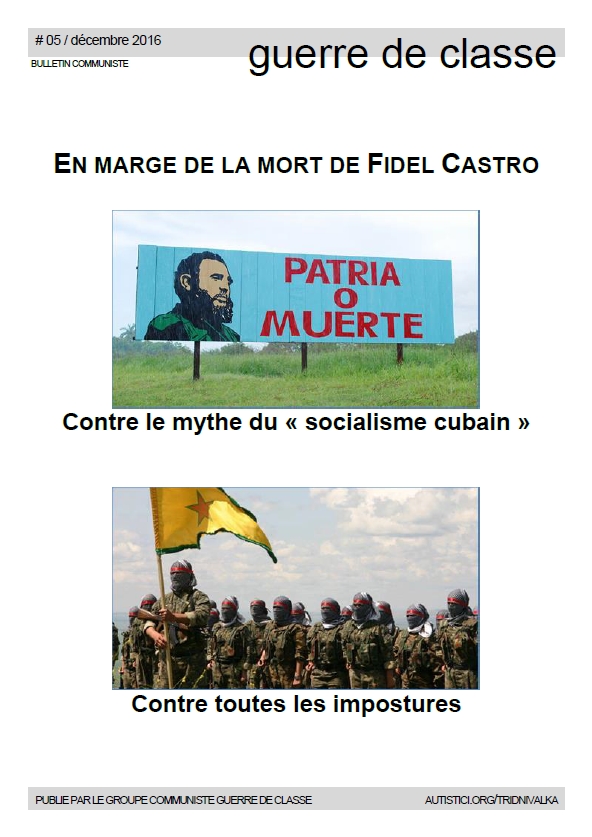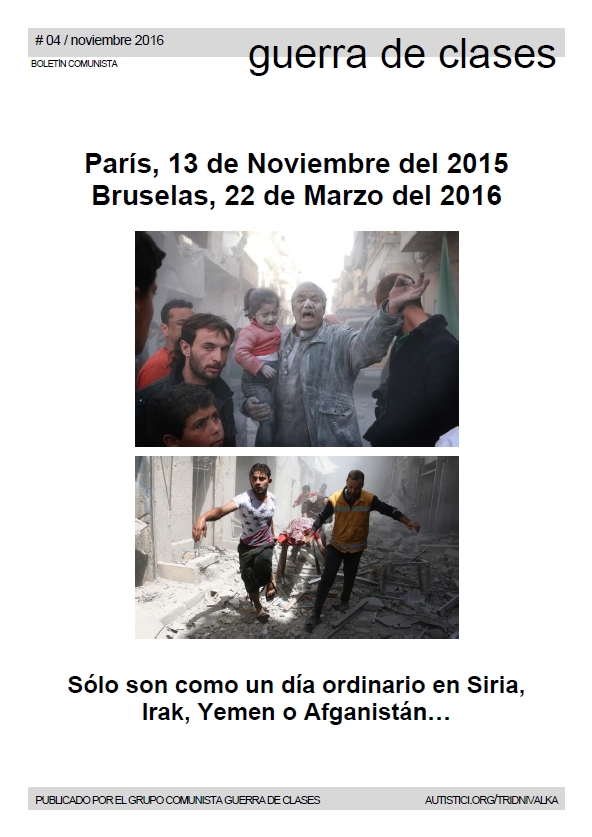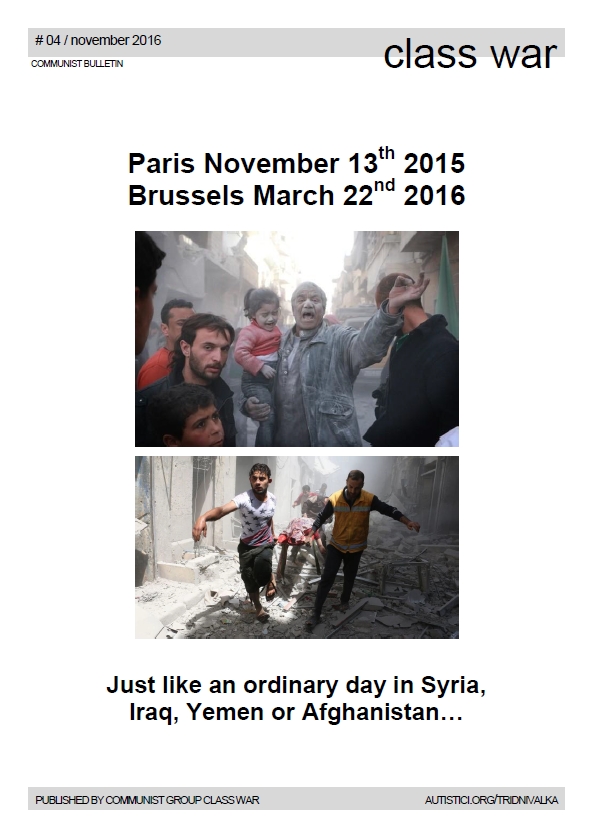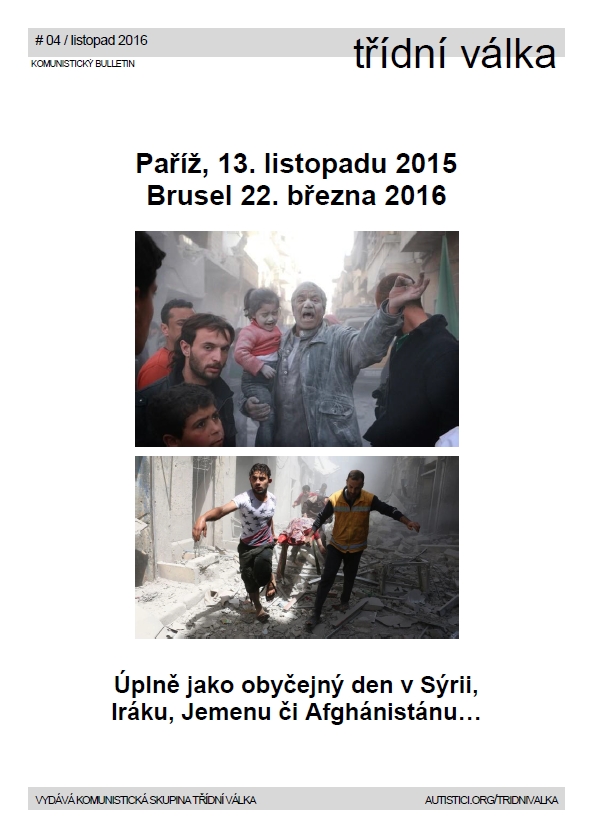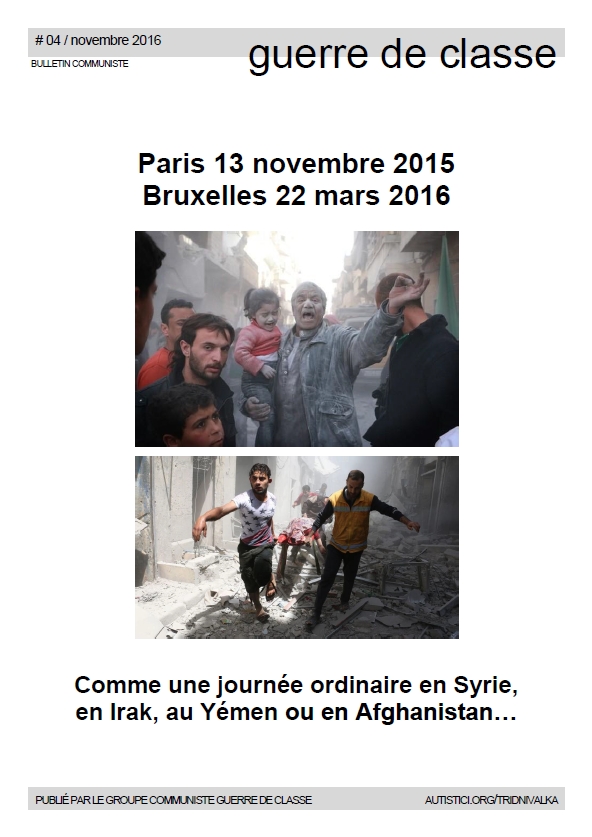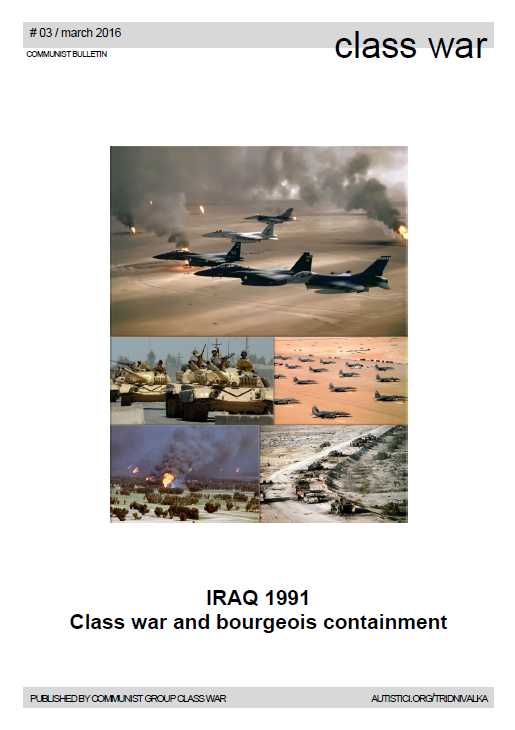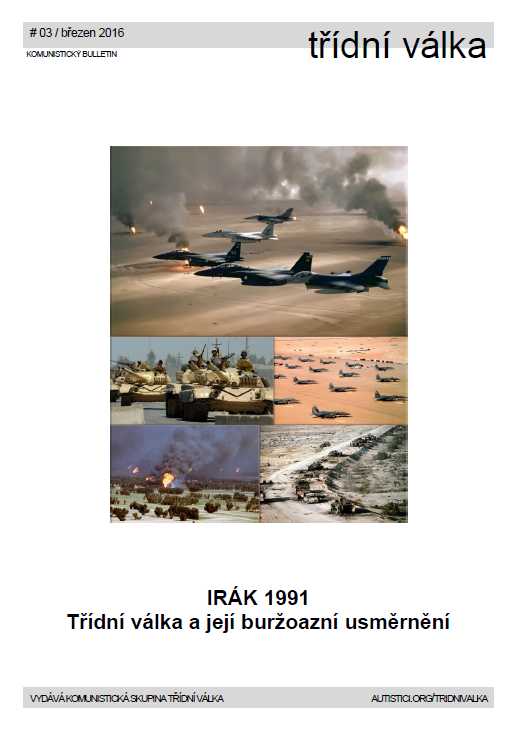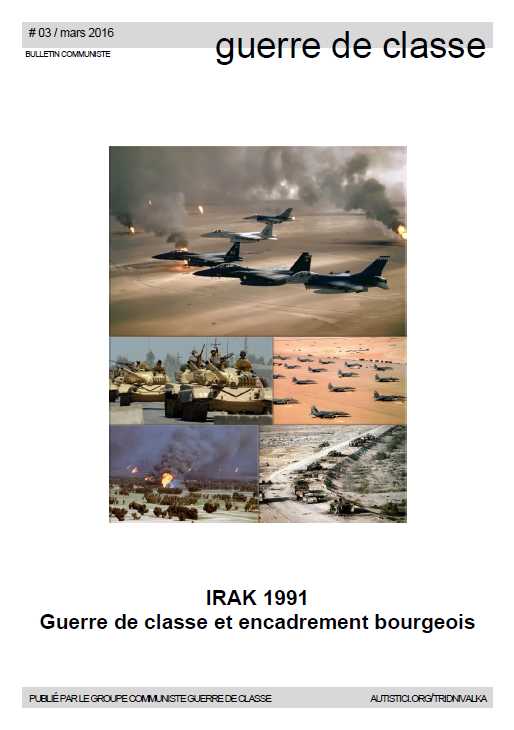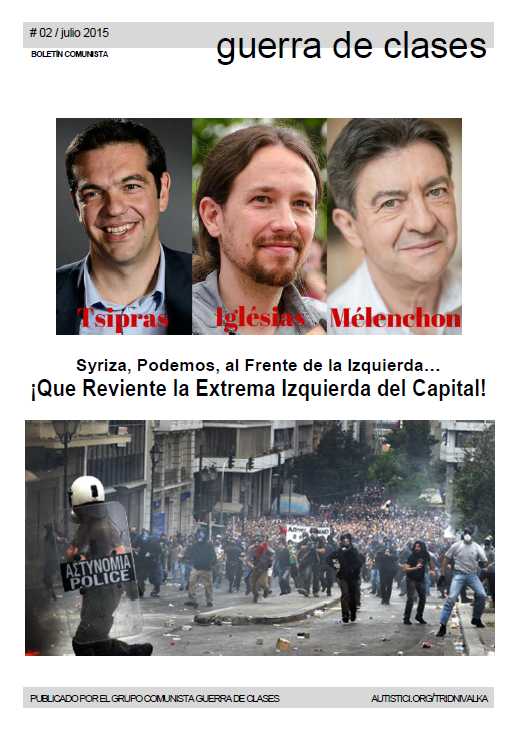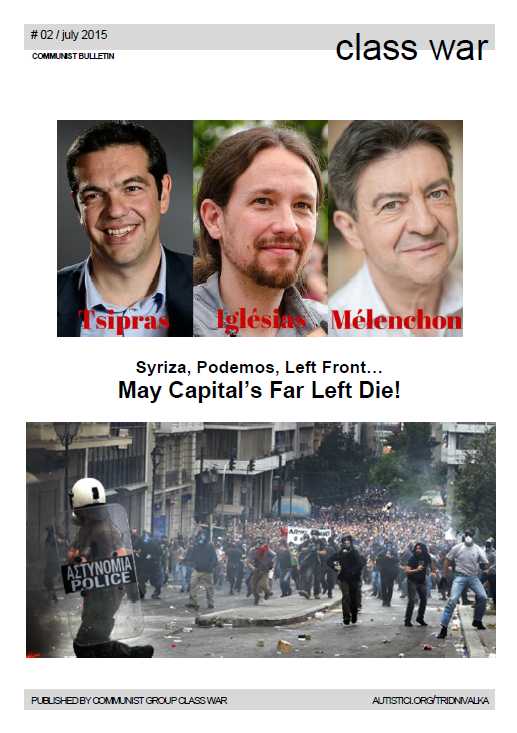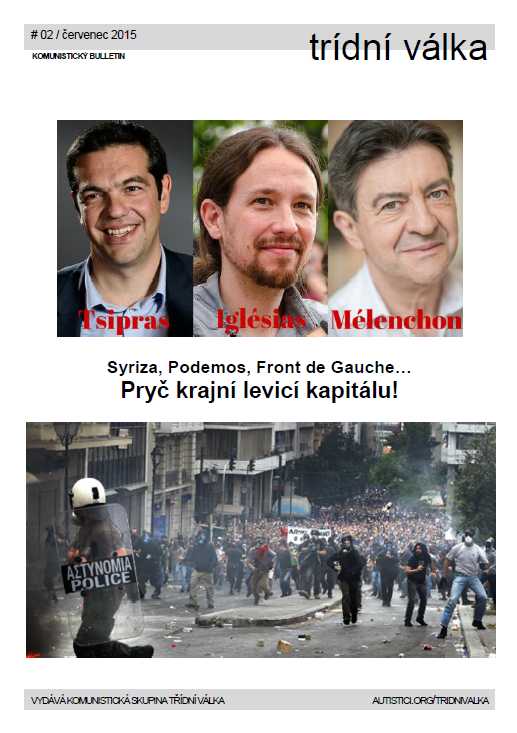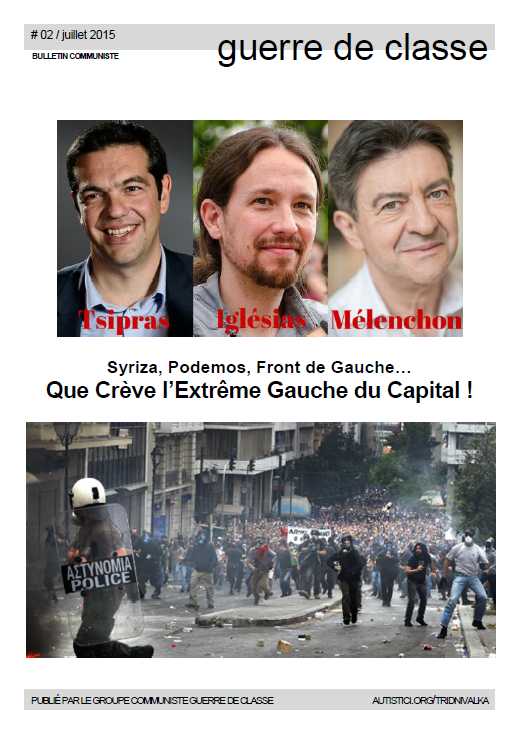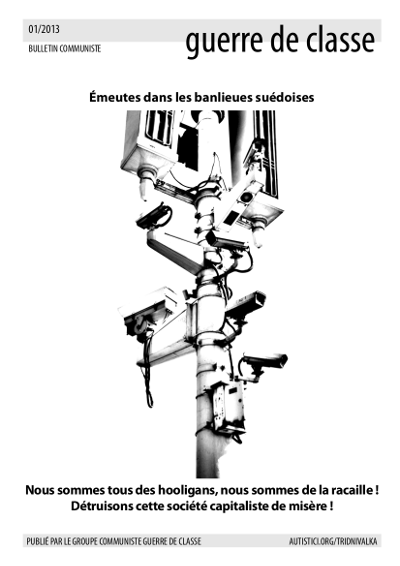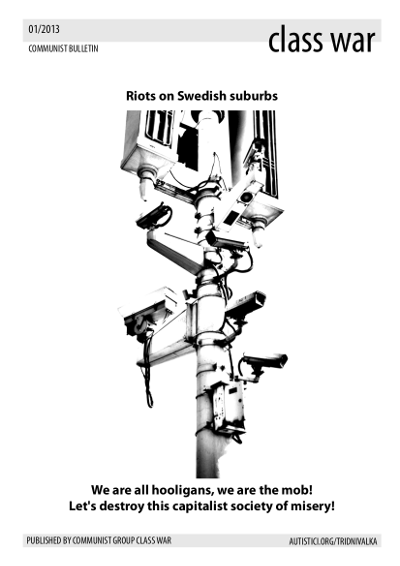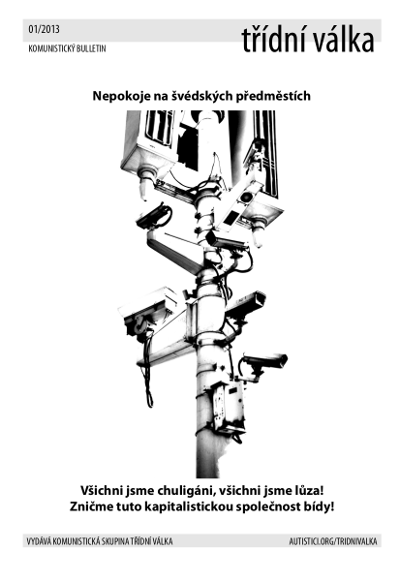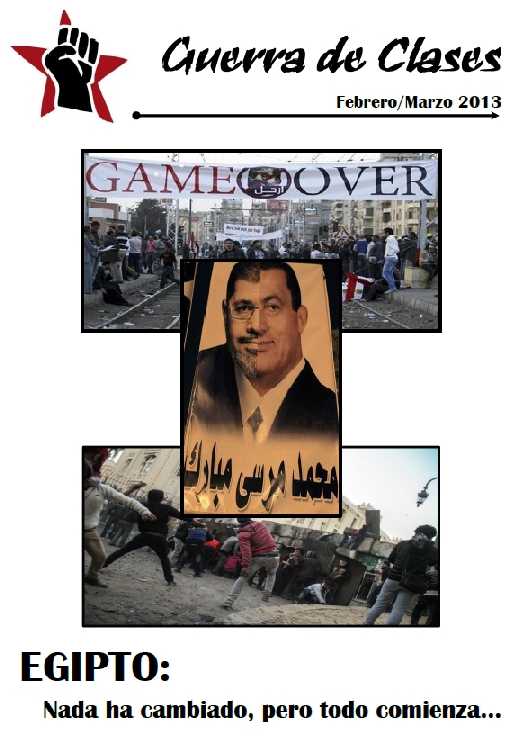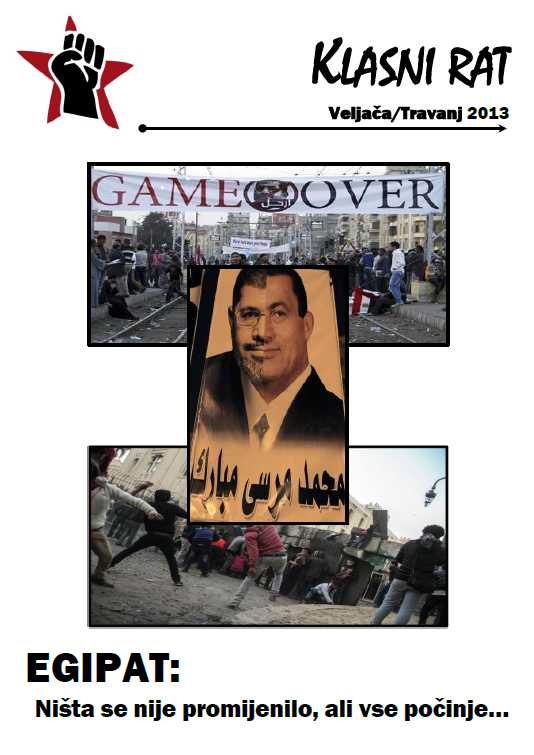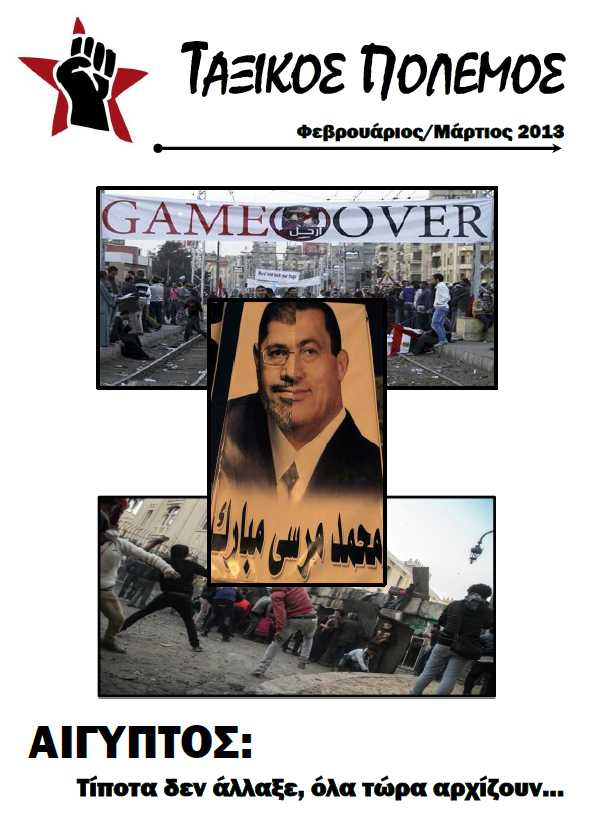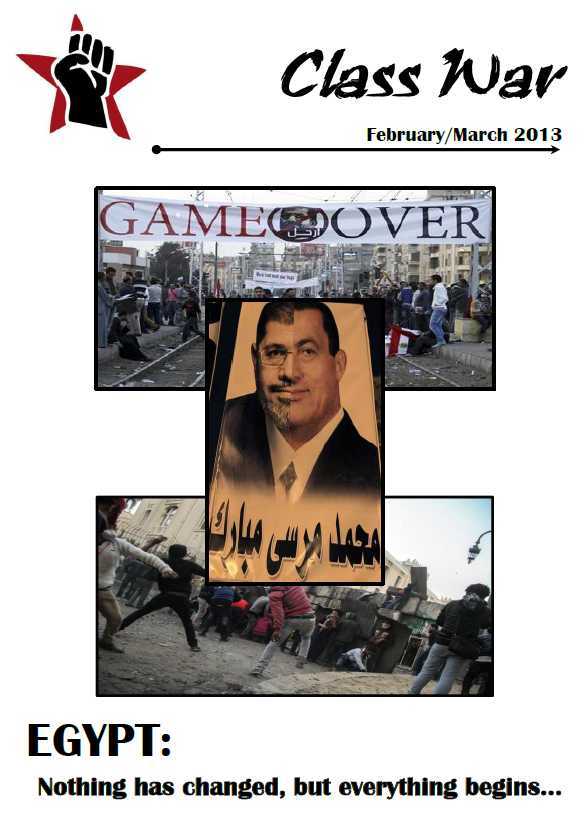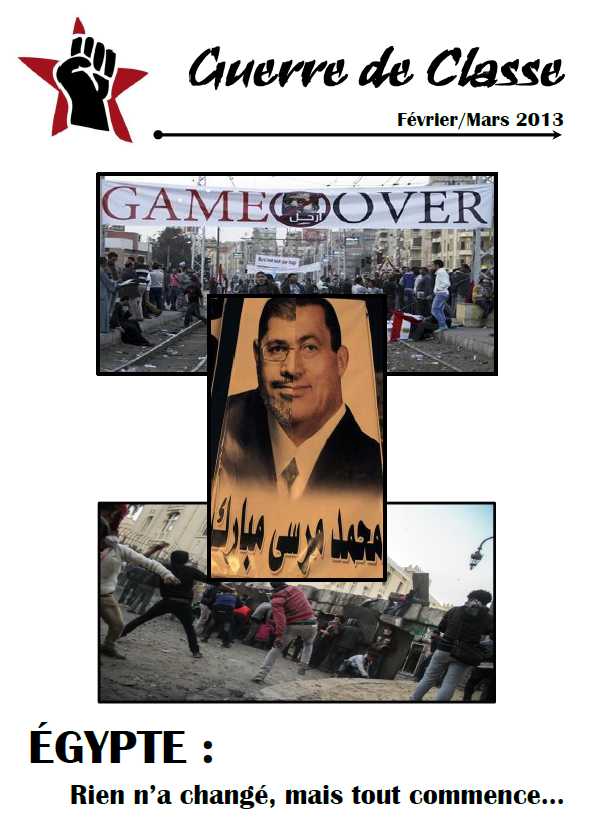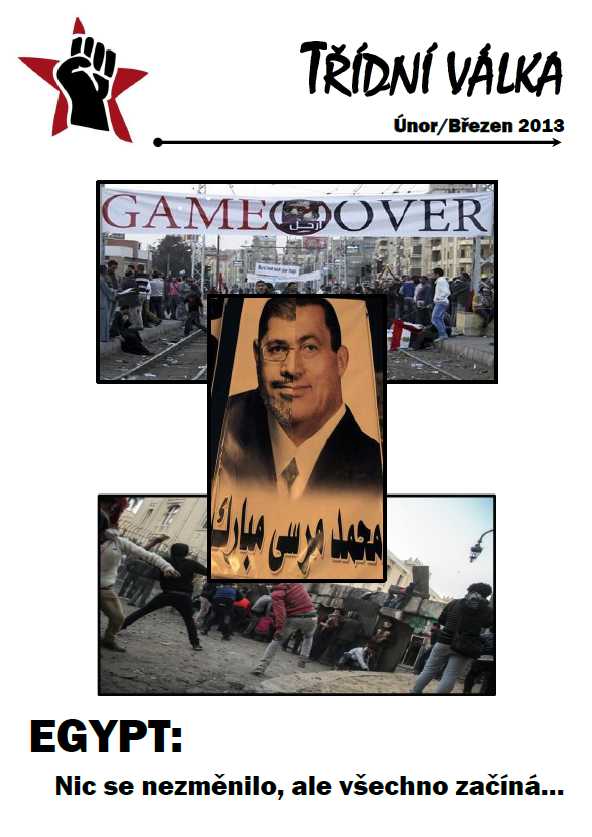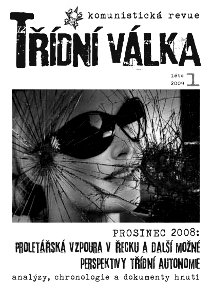/ Español / Deutsch / Français / English /

/ CLASS WAR / We are publishing here a contribution from a collective based in Mexico, called “Institute of Ballistics”. Although this text does not really strike at the heart of the matter, it nonetheless denounces anti-imperialism that is coming back into fashion, as well as “campism” that goes with it, as a false alternative and bourgeois response to the course towards generalized war that is continuously developing. More than ever, our proletarian community of struggle and criticism needs to break out of isolation and establish and strengthen contacts between its militant members (groups, collectives, individuals, associations, institutes, etc.) in order to further develop our class response, our communist (and anarchist) perspective towards and against “the existing”: i.e. this world of death that is once again, over and over again, trying to engulf us into its projects of more exploitation and war, submission and destruction…
This “short” text from the “Institute of Ballistics” is obviously not “perfect”, but anyway no contribution is perfect. We even tore our hairs out when these comrades refer to a “collapse” of the Second International or that “workers’ parties and unions” have been “absorbed” by social democracy, whereas they have always been its driving force.
We also had to decide to remove all footnotes and links to other sites (often and only in Spanish, for a publication that we wanted to be multilingual). In addition, one of the links referred to a Trotskyist site of the “Fourth International” which clearly states in one of its latest appeals: “We Condemn the Zionist-American Attack on Iran! Defend Iran!”!!! Friends of contradiction and confusion, welcome… It was obviously unthinkable for us to publish such links, so we removed them all from our publication.
This problem sparked a discussion among us about our position on the various “workers’ internationals” that have existed throughout the history of class struggles. Proletarian internationalism and associationism do not follow the tempo set by the Ramones: One, Two, Three, Four! Let us explain…
The “first” international, the International Workingmen’s Association (IWA), was a (weak but) genuine attempt to organize and associate proletarians worldwide during a period of rising workers’ struggles, bringing together genuine revolutionaries: Marxists, Bakuninists, etc., it also accepted into its ranks a whole assortment of various reformists of capital and other “adventurers”: Mazzinians, Proudhonists, mutualists, trade unionists, etc. The confrontation between the dynamics of revolution and counter-revolution during what is commonly known as “The Paris Commune”, and the defeat of our class, marked the end of this first attempt at an international regrouping of the vital forces of the proletariat.
The three subsequent internationals were successively nothing but internationals of counter-revolution in the midst of restructuring and disarming (both programmatically and “militarily”) our class.
Is it really necessary to demonstrate how the “second” international, the so-called “Socialist International” (SI), was nothing but the rise to power of all the organized forces of social democracy, that is, of the bourgeois party aimed at the proletariat? “Workers’” parties, trade unions, cooperatives, mutual societies, ad nauseam, will be the watchdogs of the working class and the tools necessary for the annihilation of our class’s subversive capacities. Building on the weaknesses of our struggles, social democracy will succeed in internalizing its project of reforming capital and thus mobilizing more and more militants from our ranks behind its banner. We salute the many comrades of our class who had the courage and lucidity to break with this organization of counterrevolution and denounce it for what it was (and still is), from its earliest years of malfeasance: Johann Most and Domela Nieuwenhuis, the Jungen in Germany, the Tribunists in Holland, etc.
The “third”, which is known as the “Communist International” (CI), was nothing but a creation from the outset of the capitalist State in Russia, repainted in red, restructured by the Bolshevik Party, which imposed the dictatorship OVER the proletariat! Here too, we salute the comrades who stood against this most radical expression of the historical social democracy and who led (with their strengths and weaknesses) the struggle for the genuine dictatorship OF the proletariat and against this counter-revolutionary international: the KAPD, the Bulgarian, Belgian, English, etc. communist lefts.
As for the “fourth” (and its relatively recent offshoot, the “fifth”), which represents only a tiny fraction of the “broad” spectrum of international Trotskyism, it is merely the logical extension of the “third”: it is hardly surprising that during the war it “critically” (sic!!!) supported one bourgeois imperialist camp against another, the Stalinist USSR (“degenerated workers’ State”, sic!!!) against Hitler’s Germany, which, moreover, did not prevent some of its sections in France from collaborating with the Vichy regime for a few months… Anyway, Trotskyism continues to support the “lesser evil” in all current conflicts: Iran against Israel, Ukraine against Russia, or the opposite, Russia against NATO, ad nauseam. And here again, we salute the comrades of the RKD, the OCR, etc., who developed a genuine internationalist activity and led the struggle against this international counter-revolutionary organization by refusing to join it when it was founded in 1938 and throughout the “Second” World War…
The only other International that we recognize as truly proletarian and communist is, unfortunately, virtually stillborn: the KAI (in English: the CWI, the Communist Workers’ International), founded in 1922 by militants who broke with the CI. We say “stillborn” because it emerged from a long process of rupture with all organized forms of counterrevolution with the claim to be an International “of the revolutionary masses” (according to the KAPD), while the peak of the wave of struggle had already been reached and passed and there was a clear global ebb in the revolutionary dynamics. This is the beginning of the so-called “sectarianizing” phase: revolutionary communist groups and parties are weakening numerically, they are dividing into several tendencies, they are fighting each other, etc. Most of them will disappear; while others will become fossilized and put forward an “alternative” to the Bolshevik parties: “workers’ councils” and councilism. Here too, as everywhere else, the form prevails over the content of proletarian associationism!
This being said, here is the text from the “Institute of Ballistics”. Enjoy reading it, and feel free to send us your critiques, comments, suggestions, etc.
CW.
Stop the war! Anti-imperialism or class struggle?
Source in Spanish: https://insurgenciamagisterial.com/parar-la-guerra-anti-imperialismo-o-lucha-de-clases/
A new war, once again…
1/ The Israeli military campaign in Palestine not only has a brutal character, but also presents racist and ethnic cleansing features, so it is not exaggerated to call it a genocidal practice without the need to enter into statistical debates. However, its nature is nothing unusual, it is a social enterprise of destruction like all other modern warfare conflicts, which has as its ultimate goal the conquest of the territory of the Gaza Strip first, and then the West Bank.
2/ However harrowing the images may be, it does not change the fact that it is one more of capitalism’s wars. Although the modalities may change, sometimes for raw materials, sometimes for market expansion or, as in this case, for a space from which to be positioned in the war between empires.
3/ What began in October 2023 has triggered a readjustment in the geopolitics of the Middle East and the world, but the traditional geometry is not enough to explain it. Capitalism has had several successful waves of globalization, from the maritime trade of the 16th century to the conquest of the Soviet Iron Curtain at the end of the 20th century, today we can affirm that it dominates all corners of the planet and that there are no longer regional opponents, given that the only opposition to the bourgeoisie could be the insurgent proletariat and the latter does not “rule” anywhere in the world (much less so in China).
4/ The regimes that are often said to be different, whether because of their form or their culture, are no less capitalist. There are no “vacuums” to be safeguarded. The material production of life in the most remote place on earth is already part of a chain of valorization, and its product is necessarily managed by the bourgeoisie that dominates that territory through its political form, the State. The images of Rafah before the war prove it, with its merchandise trade under the police control not only of the Zionist army, but also of the PNA’s or Hamas’ police.
And what about us?
5/ How to position ourselves against the capitalist wars is an issue that has divided the organized elements of the proletariat for two centuries, this because we presume that there is no such thing as a national struggle, since both classes are global, and we proletarians are comrades struggling anywhere in the world. Slogans like “if you struggle here, you struggle there” are not just verses, they express a material reality.
6/ The forms of solidarity have adapted to the historical conditions of each war. At the beginning, it was Bakunin-style romantic outlaws who crossed the world to support uprisings, from Paris to Bologna or Cuautla. But at the time of the Second International, workers’ parties and unions made them the focus of their discussions. Not to participate in the war, but to stop its machinery was an obligation of the revolutionaries, and for this an international general strike would be called. In practice all these efforts failed, since these organizations were absorbed by their enemies. It was not only social democracy that approved the declarations of war, even some patriarchs of anarchism declared that it was preferable for the war to be won by the allied side (those democracies that executed revolutionaries at the slightest provocation).
7/ However, in 1918, in the midst of world carnage, the first proletarian assault began with mutinies and desertions of conscripts on both fronts. What the Bolsheviks and Spartacists called “revolutionary defeatism”, which is nothing but the soldiers turning their weapons against their generals as a way of stopping the war, was the most important lesson of the period.
8/ After World War II, this motto changed completely. Since there were two sides, the colonial countries were to have a progressive character and the defeat of the metropoles was to trigger revolutionary processes on both sides. This applied to the partisans in Europe, the Maoists in Asia, the Pan-Arabists, Africanists and Latin Americans. The national liberation project lasted for three decades.
9/ Solidarity was a widespread practice of the proletariat around the world. Either by supplying resources (financial or human) through their respective militant bureaucracies (committees in support of the third world), either through a moral condemnation and calling for an abstract peace (hippies and new age) or in some cases questioning the role of their own bourgeoisie either as aggressor or accomplice. The motto “Bring the War Home” synthesizes the lesson of the 2nd round.
10. The fact is that these anti-colonial processes were quickly hijacked and, in some cases, created territories of domination and despotism for new local bourgeoisies (often in a military form) or established new links with an imperialist side, either the USSR or the USA. In most cases, the revolutionary groups were liquidated and the proletariat demobilized to return to production.
And what about now?
11/ The conflict in the Middle East allows us to think about the limits of the current positions on war. Although there are some excesses such as the pro-Zionist German left, we know that the rejection of this war is massive among the population, but it is expressed in the form of a sentimental moralism (which, although positive, is insufficient) and that a dangerous attitude still prevails within militant organizations: defensism, which means taking sides with one of the statist parties to the conflict.
12/ This anti-imperialism is based on the assumption that there are good nations and bad nations, whereas in reality there are only strong and weak ones. Whether at war – Ukraine vs. Russia or Israel vs. Iran, or the next USA vs. China – their respective governments oppress their population and their armies become internal executioners at any moment. The workers of these nations turn from beasts of burden into cannon fodder.
13/ The offensive unleashed by Netanyahu’s criminal regime on Tehran has brought these voices back into the arena. The calls to defend the regime of the ayatollahs forget both the origin and the function of this theocracy, the Islamic counterrevolution. In 1979 there was a huge mass upheaval to overthrow the Shah, led by the workers’ councils (Shoras) that not only sought a political change but also a social revolution. The bourgeoisie therefore had to resort to Khomeini and his political group to control it and maintain the stability necessary for capitalist development in Persia. Their supposed anti-imperialism crumbled when they launched this holy war against the Baath Party’s Iraq.
14/ Today, Iran has built an image of “resistance” against the West through its conflict with the US, but it is basically just another economic war, in which the ayatollahs are building a regional front and massacring Kurdish populations through their support to Islamic militias, as in Lebanon and Palestine. Shortly before this conflict, the government was heavily criticized by its population, including protests against the morality police after Amini’s death, who is now be buried amidst calls for national unity, just as it happened with Netanyahu’s opponents in Tel Aviv.
No War but Class War
15/ Calling to defend the small country in order to smash the empire is not only an absurd strategy, but also a useless one, which even led people to enlist under the dictatorship of Videla in Argentina or in favor of the Taliban. The revolutionary movement still suffers from the devastation left by this policy because the war is not only waged on the frontlines but also on the home front, which implies increasing the levels of exploitation in order to guarantee resources for the army, as well as an increased surveillance and repression of daily life.
16/ This being said, the criticisms of all these groups towards revolutionary defeatism are so weak that they think it is a call that the proletarians of invaded countries should let themselves be disarmed and make way for the occupation forces, but that’s ridiculous. We know that armies are not made up of conscripts, but of mercenaries and professional soldiers and we do not expect them to be moved and impressed, stop shooting and withdraw. We are not in 1917, the forms have changed, we are sticking to this principle.
/ On the blog of Proletarios Revolucionarios we can find the current state of this debate, and we invite you to read it in English /
17/ What is being defended here is not an invention, but the spirit of the actions already taking place against the war: deserting the army, as did the refuzniks in Israel, stopping the delivery of supplies as did the dockers in France, stopping the manufacture of armaments as did the English workers, or even the encampments for Gaza on US university campuses. Knowing the limits of these actions does not prevent us from recognizing their power. We must move from the pleas of civil society and consumer boycotts to breaking and blocking the chains that make military actions possible.
18/ The call to “break off diplomatic relations”, which continues to prevail in the demonstrations, must become an action aimed at short-circuiting the conditions that make war possible. Broaden our thinking, discussion and conspiracy, and this until the weapon of criticism can become the criticism of weapons, on all fronts, that of Trump and Netanyahu, but also that of the Ayatollahs, from the Arctic to Antarctica.
Institute of Ballistics – 06/26/2025
English translation: The Friends of the Class War / Los Amigos de la Guerra de Clases
